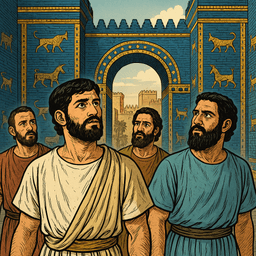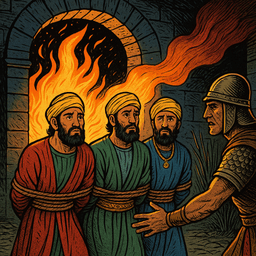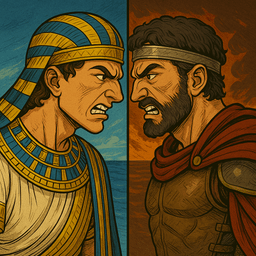
Differences in the Old Greek Version of Daniel (Chapter 12)
Rest up, DaniEl!
This chapter of the ‘Old Greek’ version of Daniel has differences in all but one of the 13 verses.
These are quite mysterious, and may appear to be meaningless at first. However, they may betray a pattern of deliberate corruption in the Hebrew text by the pharisees in early 2nd century AD, who were trying to promote the so-called ‘prince,’ Simon bar Kochba, as their Messiah.
Here are the most interesting differences:
Verse 1
Nearly the entire verse is different in the Old Greek, with most easily being translation choices.
Two differences, however, could also be suspicious:
- In the Old Greek, you have a ‘great messenger’ who ‘will pass through the land’.
- But in the Hebrew, you have a ‘great prince’ who ‘stands up’.
In the late 1st / early 2nd century AD, the pharisees were trying to promote rebel commander Simon bar Kochba as the Messiah, and Kochba famously referred to himself as ‘the prince’. Further, as a rebel commander with little support against mighty Rome, one couldn’t really describe him as ‘passing throughout the land’, as he just couldn’t do anything remotely like that… But you could describe him as ‘standing up’.
Could this be a deliberate corruption of the Hebrew text to support that messianic claim? Perhaps, but this is just speculation.
There are other such differences in other chapters of the Hebrew text that we suspect may have been made to support that messianic claim… But no records survive of Simon bar Kochba supporters quoting particular verses in Daniel. So this remains an interesting theory and nothing more.
Hebrew of verse 1 and end-time interpretations
The more vague wording in the Hebrew of 12:1 is very useful for modern fans of end-time prophecies, who interpret this as referring to the modern day. The Old Greek, however, is far more difficult to apply in that way.
Specifically, their interpretations are possible because the Hebrew says the time of distress will be the worst since ‘there was a nation’ (instead of since the Jews came into being), and also because it just says ‘at that time,’ whereas the Old Greek specifies MichaEl passing through the land (revealed as Judea in the previous verse, 11:45).
So end-time enthusiasts won’t be fans of the Old Greek text, since it can’t be applied in that way so easily.
Verse 2
Verse 2 of the Old Greek has an interesting mention of being permanently scattered/dispersed as one possible bad outcome for the unfaithful. This is not mentioned in the Hebrew version.
We could speculate that the mention of ‘dispersed/scattered’ may have been removed from the Hebrew text because the Pharisees were trying to apply this prophecy to their day and their false Messiah, Simon bar Kochba.
Bar Kochba was supposed to be the Messiah to restore the Jews to the land. This verse, saying that the Jews would be dispersed permanently (the exact word used is age-long), would have been massively problematic when the pharisees were trying to promote him as the Messiah who would defeat the Romans.
It’s hard to promote a guy as the Messiah and then also say the Jews who were captured in AD 70 would be dispersed permanently. No, he’s supposed to defeat the Romans and restore the Jews to the land! A permanent diaspora is totally incompatible with that. Of course, what the Old Greek text says is perfectly correct, those Jews died without ever seeing their homeland again (most were sold as slaves, some may have even built the Colosseum in Rome).
At least, this is a theory that fits many of the other changes.
Verse 4, 6, 9, and 10
The differences in these verses are bizarre.
While in Hebrew, the decree is locked up until the end when:
‘…many shall run back and forth and increase in knowledge.’
In the Old Greek it’s locked up until the end when:
‘…many people go mad and the land is filled with wrongdoing.’
However, if we look at it from the point of view of potential corruptions by the pharisees, trying to promote Bar Kochba as the Messiah, they may have found this verse rather difficult to apply if it says that everyone will be crazy.
Changing it to speak of ‘knowledge’ may have flattered themselves. Remember, the pharisees had set up the system of the synagogues and their own schools of interpretation, becoming the religious establishment of Rabbinic Judaism.
If anyone was going to ‘increase in knowledge’, it would be them.
Again, though, we have no direct proof of this, so it’s just speculation. But, at least we have one theory instead of none.
It’s interesting that the Hebrew version of this verse is another favourite of end-time enthusiasts, who see it as referring to the modern day. They either say the ‘increase in knowledge’ refers to modern technology, or that it’s a reference to their own preaching of the Bible.
Yet again, the Old Greek is not useful to such persons.
Verse 6 seems to have a change on a similar theme. The question asked to the man in linen is suddenly missing the end part, ‘when will this cleansing come?’ So the entire situation has been changed!
Then in verse 9 (verse 10 in other numbering systems), the Old Greek has some horrible nasty ‘testing’ for everyone, but the Hebrew version has people being ‘purified, made white, and refined’.
Finally, in verse 10, wise people will ‘take heed,’ but in the Hebrew, they just understand.
It was previously very negative:
- The great messenger will pass through the land (usually meaning a military invasion)
- Some people will be permanently scattered (diaspora)
- People will go mad
- There’ll be wrongdoing everywhere
- These need cleansing
- They will be tested and purified
- The wise will take heed
But somebody seems to have changed it to be more positive:
- The great prince will stand up
- People will be searching
- And increasing in knowledge
- They will be purified, made white, and refined
- The wise will understand
There’s a clear pattern here. If someone really did make these changes deliberately, is it just a coincidence that it happens to be quite friendly to the pharisees’ position?
The changes are so brazen; it’s actually quite comical.
The pharisees were enamoured with their own intellectual brilliance, they thought their job was to educate all the despised lower people. Then, they foolishly promoted Bar Kochba as the Messiah, who even took the title ‘prince.’
It’s certainly a compelling case. Obviously, we can’t prove it because few records survive, but it’s fun to speculate. Ultimately, though, we may never know the truth.
The Old Greek: A superior text
Throughout these 12 chapters, we’ve seen many differences between the Hebrew and the Old Greek text.
Many are silly translation errors (or perhaps scribal errors or damage in the Hebrew manuscript they used). Others are petty copyist errors in the Greek text’s transmission down through the centuries. We believe we can fix and explain nearly all of these.
Other differences reflect the natural differences you see in translation.
Further, the Old Greek text is generally more historically accurate. Much of it is easier to apply to the ancient world.
However, others are extremely suspicious differences that could, perhaps, be explained as a deliberate pattern of corruption in the Hebrew text. Our prime suspects are the pharisees in early 2nd century AD, who were trying to promote the so-called ‘prince,’ Simon bar Kochba, as their Messiah, while simultaneously trying to discredit Christians and Jesus.
So all things considered, the Old Greek text is an extremely valuable text, a vital witness to the original text of Daniel, and certainly our preferred version.
Differences
12:1 (i)
Instead of saying ‘at that time’ like in the Hebrew, the Old Greek says ‘according to land.’
Some scholars argue that it could be interpreted as meaning ‘at that time,’ but this is not the usual meaning. The normal meaning is ‘throughout the land.’
Therefore, the Old Greek specifies that it’s referring to Judea itself, but the Hebrew does not. Why does this difference exist? Well, it could be an interpretative translation by the Greek translator, or it could be a later change in the Hebrew text.
12:1 (ii)
The Old Greek says MichaEl will:
‘…pass through.’
However, the Hebrew says that MichaEl will:
‘…stand up.’
Generally, the expression to ‘pass through’ or ‘pass by’ is used in military terms, meaning some king of military action, but it implies widespread action across the entire land. The Hebrew term ‘stand up’ also implies taking action, but does not necessarily imply widespread action.
It’s very unclear why the difference exists, but the difference could happen by accident very easily!
The Hebrew word for ‘shall stand’ and the word for ‘pass by/through’ look very similar:
- יעמד = shall stand
- יעבר = shall pass through
So our Greek translator could have misread it, could have worked from a Hebrew manuscript with a copyist error, or the Hebrew text later acquired a copyist error.
Just look at that last letter; it’s notorious for being constantly confused:
Dalet (ד) vs. Resh (ר).
So what happened? Which is the original? We have no idea!
12:1 (iii)
The Old Greek describes ‘MichaEl’ as ‘the great messenger’, but the Hebrew calls him ‘the great prince’ or alternatively ‘the great commander’.
Some view ‘great messenger’ and ‘great prince/commander’ equivalent terms, but they are not; princes are not normally referred to as messengers.
Why does it use a different term? It could be an interpretative translation; perhaps the Greek translator wanted his audience to understand that MichaEl is a spirit creature, and using ‘messenger’ instead of ‘prince’ would clear that up.
There’s no way that the Hebrew could have been misread, nor any way that the Greek had a copyist error to turn one word into the other. It was either a deliberate translation choice in the Greek, or a deliberate later change in the Hebrew, where the Hebrew was later changed to say ‘prince/commander’.
We discussed why this is a possibility in our introduction above.
12:1 (iv)
The Old Greek says the time of distress will be the worst since ‘they (the Israelites) came into being’.
The Hebrew says something more vague, that it will be the worst since ‘there was a nation’.
So the Old Greek is more specific, but the Hebrew makes it sound like it could be any nation at all.
This could easily be a simple interpretative translation by the Greek translator, which is very much in line with the context, since previously the messenger mentioned ‘the sons of your people’, it’s quite reasonable to see this as referring to the Jewish nation.
Alternatively, there could be a Greek copyist error… ‘Since a nation came to be’ would appear in Greek unicals as:
- ΑΦΟΥΕΓΕΝΕΤΟΕΘΝΟϹ
Then, if the last word was accidentally dropped, it becomes:
- ΑΦΟΥΕΓΕΝΕΤΟ (‘Since came to be’)
And if a later scribe corrects the grammar, it becomes:
- ΑΦΟΥΕΓΕΝΗΘΗϹΑΝ (‘Since they came to be’).
However, this is speculation. There’s no obvious way the change was caused by confusing the Hebrew.
12:1 (v)
The Old Greek says that the people in the book will be:
‘…exalted/lifted up.’
But the Hebrew says they’ll:
‘…be delivered/escape.’
This is quite a difference.
There’s a weak possibility that the Hebrew was misread (יָרוּם versus יִמָּלֵט) if the manuscript was damaged, or if the Hebrew later acquired a bad copyist error, but this isn’t a very strong possibility. There’s no obvious path for any Greek copyist error.
So it could be a deliberate Greek translation choice, or a deliberate later change in the Hebrew. We don’t know.
12:2
The Old Greek seems to give three outcomes for people. The faithful have life eternal, like in the Hebrew. But the bad outcome seems to be split in two in the Old Greek:
- Some are reproached/disgraced,
- But others will be dispersed/scattered and suffer eternal shame.
The Hebrew only mentions one bad outcome: one of disgrace and contempt.
So we have some puzzling diffrences here, with no clue as to the cause. These differences can’t be explained by obvious misreadings or copyist errors. Therefore, all the other possibilites are on the table:
- The Greek translator made a very interpretative translation
- Or it was added to the Greek later
- Or it was removed from the Hebrew later
The most striking part of the difference is the presence of ‘dispersed/scattered’ (the Greek word diaspora!). That raises eyebrows because it reminds us how being scattered or dispersed was what Yahweh Himself warned would happen for unfaithfulness (e.g. Leviticus 26:33).
12:3
The Old Greek says something quite different at the end of the verse. Literally:
‘…those strengthening my words’ will be like the stars.
In Hebrew, it says:
‘…those who lead many to righteousness’ will be like the stars.
They are entirely different words, with no obvious misreading of the Hebrew, no obvious confusion between Hebrew and Aramaic, nor any obvious Greek copyist error. It’s hard to even see it as a translation choice.
12:4
The Old Greek says the decree will be locked up until the end, until:
‘…many people go mad and the land is filled with wrongdoing.’
The Hebrew says something entirely different, that the decree will be locked up until the end when:
‘…many shall run back and forth and increase in knowledge.’
Confounding the situation is Theodotion’s 2nd century AD translation, which says:
‘…until many are taught and knowledge is increased.’
The differences here are entirely unexplainable by translation or copying. There’s no obvious way the Hebrew could be misread to say what the Old Greek says, nor any obvious Greek copyist error.
So yet again, we find ourselves wondering if the Greek text deliberately mistranslated, or was changed later, or the Hebrew text was changed later. We have a theory why this happened, which we explained in our introduction above.
12:5
No important differences.
12:6 (i)
There are two differences here.
This first one is odd. The Old Greek has DaniEl asking the question, but the Hebrew has one of the messengers asking the other one.
However, the difference is only one small letter, yod (י), the smallest Hebrew letter! So it’s very possible that either the Greek translator made a mistake, or he was working from a damaged Hebrew manuscript (either worn or containing a copyist error), or the Hebrew text acquired a copyist error later.
This leaves us completely in the dark about what is actually original. It may have been DaniEl, it may have been one of the other figures. Who knows.
12:6 (ii)
Secondly, in the Old Greek, the question asked is much longer. In Hebrew, the question is just:
‘…when shall be the fulfillment of these wonders?’
But in Old Greek, it’s:
‘…when will these amazing things you’ve told me about finally happen? When will this cleansing come?’
Either the Hebrew has lost that extra detail over time, or the Greek translator added it, or someone else added it to the Greek later. We speculate why this happened below.
12:7
Towards the end there’s a very strange bit of wording. The Old Greek says, literally:
‘The consummation of the hands of release of the holy people.’
Erm, huh? What?
We have tried to make sense of it, and translate it as:
‘The completion of the release of the holy people’s power.’
…which doesn’t do much to help!
The Hebrew is much clearer, saying:
‘When the power of the holy people has been finally broken,’
…which is much more understandable.
There’s no obvious way the Greek could have originally said something similar to the Hebrew, but then have been corrupted — the words are just too different. Likewise, there’s no obvious way the Hebrew could have been misread or had copyist errors.
The most plausible explanation is that the Greek manuscript suffered some damage here, and then a later scribe did his best to fix it, but didn’t guess correctly. This seems more plausible because we’ve been left with a garbled mess, not some change that could fit an agenda (that we know of).
12:8 (i)
The Old Greek has DaniEl add that he didn’t understand ‘the timing’ (or alternatively, that he didn’t understand things ‘at that time’). This could just be a translation choice.
12:8 (ii)
The rest of DaniEl’s question is different in the Old Greek. He asks (literally):
‘What is the meaning of this speech, and what are these parables?’
In the Hebrew, though, DaniEl asks:
‘What will be the outcome of these things?’
So in one, he asks for the interpretation, but in the other, he asks for the outcome. This could just be a translation choice, as people tend to form questions in different customary ways in different languages. Indeed, the Greek way of thinking at that time was more analytical, so that may explain the difference.
12:9 (i)
A numbering difference. In the Old Greek numbering, the last few words of verse 9 are found at the start of verse 10 in other numbering systems. This numbering was added thousands of years later, and is not part of the original text.
12:9 (ii)
The Old Greek does not have a statement present in the Hebrew, where it says that the prophecy will be locked up ‘until the time of the end.’ Instead, it skips straight into the next verse.
Could this be a copyist error? Sure, easily. But whose?
It’s possible that it was lost from the Greek over centuries of copying, but it’s also possible that it was missing from the Hebrew manuscript our Greek translator used. Yet it’s also possible that it was never in the original Hebrew, but was added later!
There’s no way to tell.
However, the meaning isn’t very badly affected as the context shows that the prophecy was for the time of fulfillment (12:13).
12:9 (iii)
The Old Greek says that many will be ‘tested’ and ‘purified.’ But the Hebrew (these words are in verse 10) says that they will be ‘purified, made white, and refined.’
So while it’s similar, testing something for strength is different from cleaning something to make it white and free of impurities. One sounds harsh, the other sounds like you’re being done a favor!
Could this be a translation choice? Maybe. But it also follows the pattern of the other changes, where the Old Greek is more negative than the Hebrew. We explore this in our introductory comments above.
12:10
The Old Greek says that the understanding ones will ‘pay attention/take heed.’
In contrast, the Hebrew merely says the will ‘understand’.
This difference is not small. You can passively understand something and do nothing, but if you pay attention, you’ll take action. We discussed this in our introduction. It’s not likely a misreading of the Hebrew or a Greek copyist error, as the necessary words are totally different.
12:11
Here’s a very strange difference.
When the verse talks about the setting up of the ‘disgusting thing’, the Old Greek adds a tiny detail (an extra verb), saying:
‘From the moment they stop the continuous sacrifice and get ready to set up that disgusting thing of desolation…’
The Hebrew doesn’t mention this. It’s not a big difference, but it’s a difference, and it may mean something.
12:12
The Old Greek has a curious literal difference here.
Like the Hebrew, it says that the one who waits (actually, it says ‘remains’) will be happy, but then it diverges. The Hebrew says that he will reach the 1,335 days, but the Old Greek uses the word ΣΥΝΑΞΕΙ which means ‘he will gather together at’ the 1,335 days.
This is likely a Greek copyist error.
We explain this in the translator note.
12:13 (i)
The Old Greek has the man in linen say a little bit more, telling Daniel that:
‘There’s still many more days and seasons ahead before everything wraps up…’
The Hebrew doesn’t have this. Could it be a literary flourish on behalf of the Greek translator? Perhaps, or perhaps the Hebrew accidentally lost it in copying at some point.
12:13 (ii)
The Old Greek makes it plain that DaniEl will one day ‘arise in your glory,’ but the Hebrew simply says he will ‘arise to your inheritance.’
So the Old Greek plainly says that his ‘inheritance’ will be a good, glorious one. Again, we don’t know if this was added to the Greek or lost from the Hebrew.
Contents
-

Differences in Daniel -

in Chapter One -

in Chapter Two -

Chapter Three -

in Chapter Four -

in Chapter Five -

in Chapter Six -

Chapter Seven -

Chapter Eight -

in Chapter Nine -

in Chapter Ten -

Chapter Eleven -
